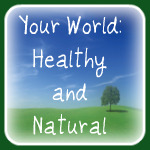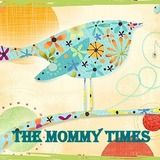Quickly before delving into Organic Food of pt 3 Green in the Kitchen series, I must share this good news. I bought myself a Moop! 'A Mop?' You ask. No, a Moop! Also known as, a bag I have admitedly been coveting for oh, a year and a half at least. It was an early Mother's Day present to myself(along with a handmade coin purse that is a.d.o.r.a.b.l.e.) And it might be used but hey, it's new to me and I'm so happy to finally enjoy one in real life. Oddly enough, another church mom has the same bag(different color!) Always a nice surprise to find another person that knows what Etsy is all about. moop.etsy.com
It's business time!
Organic Food
If you're new to organic food it may seem a little daunting at first. Higher prices being the major hurdle. The trick is knowing what is and isn't worth getting and knowing where to look. Many bigger retailers like Walmart and Target have started carrying their own organic store brand. These can save you some money over the more expensive name brand items. Farmers' Markets are another fantastic place to buy organic AND local. Nothing like cutting out the middle man and bring food home directly from the source! There are markets all over the place, most neighborhoods/suburbs have their own so you don't have to go downtown or to the boonies to find one. Also check around for natural food stores like Campbells. And of course being the internet age, there is a website that can help you wherever you are: http://www.localharvest.org/. They list Online Stores, Farms, CSAs, Farmers' Markets, Restaurants and Grocery/Coops. Pretty slick, check it out!
So just what is worth getting that is organic? Starting off, Meat and Dairy are two of the top recommended things to do if possible. Dairy includes milk, butter and yogurt. Meat includes eggs. The meat isn't at risk to high pesticide exposure but more so because it has the biggest environmental impact. This is because of the conventional methods used to raise animals, using hormones to speed growth, antibiotics to resist disease and pesticides and fertilizers to grow the grain needed to feed them. One story I think about often is what my husband saw while serving his mission in Brazil for two years. The girls there hit puberty much, much earlier than girls here due to the hormones added to their chicken. Even here my mother(who is a teacher), says it is occurring earlier than ever.
Dairy is mostly of note as it is a big part of kids' diets. Pesticides have been detected in human breast milk so of course it is going to be found in dairy products, as well. Most of the 'bad stuff' gets excreted in the fat that is used in milk, butter and yogurt. In recent studies it has also been found that organic milk/dairy products contain significantly more amounts of vitamins than conventional dairy products. They are now recommending pregnant/nursing women to drink organic milk as much as possible.
Now for the veggies and fruit. According to the Environmental Working Group (EWG), consumers can reduce pesticide exposure by 80% by avoiding the most contaminated fruits and vegetables. The easiest way to keep it all straight is to remember a few key things: produce with thin skin and stems creating an indentation in the top are most likely high in pesticide. This would include peaches, strawberries, apples, bell peppers, celery, pears, tomatoes, nectarines, grapes and cherries. The thin skin provides little barrier to the chemicals and the stem fruits have pooling of chemicals around the stems which allows for more absorption. Leafy greens (lettuce, spinach) and root crops such as carrots and potatoes are also recommended to buy organic.
I know, it's a lot. But never fear, because there is another rule of thumb if you don't have a money tree in your backyard. Buy organic what you eat a lot of. An apple every day? Get organic. Rarely get through a thing of yogurt before it expires? Don't buy organic. Simple.
I'll also list quickly things not to waste your money on buying organic: onion, avocado, sweet corn, pineapple, mango, asparagus, sweet peas, kiwis, cabbage, eggplant, papaya, watermelon, broccoli, sweet potatoes, tomatoes*. *debatable.
In general, being smart about what's worth buying organic and cutting processed foods as much as possible from your diet will equal a happy pocketbook and healthy body. Lastly, the cheapest way to get organic? Grow your own. And no excuses about a lack of yard or time- container gardening and square foot gardening are easy for even the level 0 and lazy gardeners. Check out my blog midwestbarefootgardener.blogspot.com in a couple weeks as I start to chronicle the joys and struggles of gardening in the Midwest!
Oh yes, and save those food scraps (minus meat and and dairy) for the compost pile!
Monday, April 27, 2009
Green in the Kitchen pt 3 Organic Food
- Share this on del.icio.us
- Digg this!
- Stumble upon something good? Share it on StumbleUpon
- Share this on Reddit
- Add this to Google Bookmarks
- Tweet This!
- Share this on Facebook
- Share this on Mixx
- Subscribe
- Buzz up!
- Share this on Linkedin
- Submit this to DesignFloat
- Share this on Technorati
- Submit this to Script & Style
- Post this to MySpace
- Share this on Blinklist
- Share this on FriendFeed
- Seed this on Newsvine
Widget by Css Reflex | TutZone
Subscribe to:
Post Comments (Atom)








































































1 comments:
Lots of great info here! Thanks so much for finding my blog and entering all my giveaways! I really hope you win something soon! :)
Post a Comment